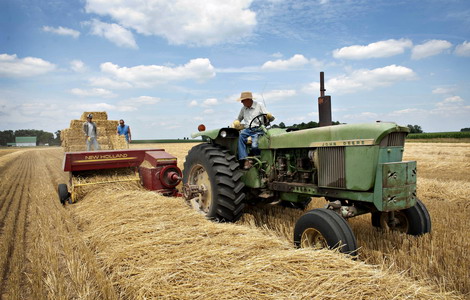Economy
Hedge fund farms reap from food doomsday warnings
Updated: 2011-08-11 11:01
By Seth Lubove (China Daily)
|
 |
|
US farmers stack straw bales in Kirkland, Illinois. Investors are pouring into farmland in the United States and parts of Europe, Latin America and Africa as global food prices soar. [Photo / Bloomberg] |
Except, now, he owns it. As co-founder of investment company Ceres Partners LLC, Vieth oversees 61 farms valued at $63.3 million in Illinois, Indiana, Michigan and Tennessee. He's so enthusiastic about the investments that he quit a job in 2008 overseeing $7 billion in fixed-income assets to focus full time on farming, Bloomberg Markets magazine reports in its September issue.
"When I told people I was leaving to start an investment fund in farmland, they said, 'You're doing what?'" Vieth said. "It will always be difficult for Wall Street firms to understand. It's not like buying stocks on a computer."
It's much better: Returns from farmland have trounced those of equities. Ceres Partners produced an average annual gain of 16.4 percent after fees from January 2008, just after the firm started, through June of this year, Vieth said.
The bulk of the returns are in rent payments from tenant farmers who grow and sell the crops and from land appreciation. The Standard & Poor's GSCI Agriculture Index of eight raw materials gained 5.3 percent annually over the same period, and the S&P 500 Index dropped almost 1 percent.
Investors are pouring into farmland in the United States and parts of Europe, Latin America and Africa as global food prices soar. A fund controlled by George Soros, the billionaire hedge-fund manager, owns 23.4 percent of South American farmland venture Adecoagro SA.
"I have frequently told people that one of the best investments in the world will be farmland," said Jim Rogers, 68, chairman of Singapore-based Rogers Holdings, who predicted the start of the global commodities rally in 1996. "You've got to buy in a place where it rains, and you have to have a farmer who knows what he's doing. If you can do that, you will make a double whammy because the crops are becoming more valuable."
The growth in demand for food, spurred by the rising middle classes in China, India and other emerging markets, shows no signs of abating. Food prices in June, as measured by a United Nations index of 55 food commodities, were just slightly below their peak in February. The UN's Food and Agriculture Organization said in a June report that it expects food costs to remain high through 2012.
So many investors have rushed to capitalize on food prices in the past three years that they may be creating a farmland bubble. The Federal Reserve Bank of Kansas City, which covers Colorado, Kansas, Nebraska and other agricultural states, said in May that farmland prices had surged 20 percent in the first quarter compared with a year earlier.
Hedge-fund manager Stephen Diggle calls farming the ultimate safe haven. Diggle began buying farms with his own money in 2008 after Lehman Brothers Holdings Inc filed for bankruptcy in September of that year and the S&P 500 plunged 43 percent in the next six months. He purchased 3,237.5 hectares in Uruguay, three smaller plots in southern Illinois and a 32.37-hectare New Zealand kiwi-and-avocado orchard.
"We really thought all the investment banks would go under," Diggle said. "Everyone said, 'Buy gold.' But at the end of the day, you can't eat it. If everything else goes and I just have these farms, it makes me moderately wealthy."

Specials

Star journalist leaves legacy
Li Xing, China Daily's assistant editor-in-chief and veteran columnist, died of a cerebral hemorrhage on Aug 7 in Washington DC, US.

Beer we go
Early numbers not so robust for Beijing's first international beer festival

Lifting the veil
Beijing's Palace Museum, also known as the Forbidden City, is steeped in history, dreams and tears, which are perfectly reflected in design.